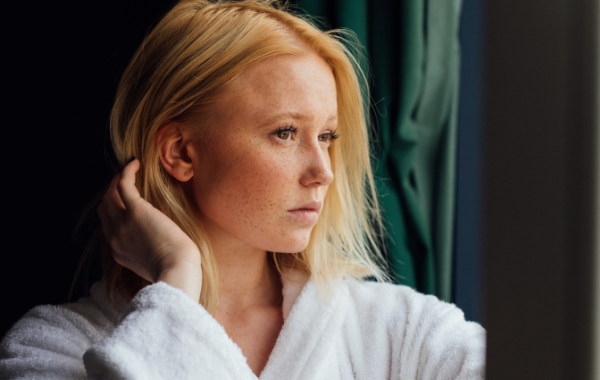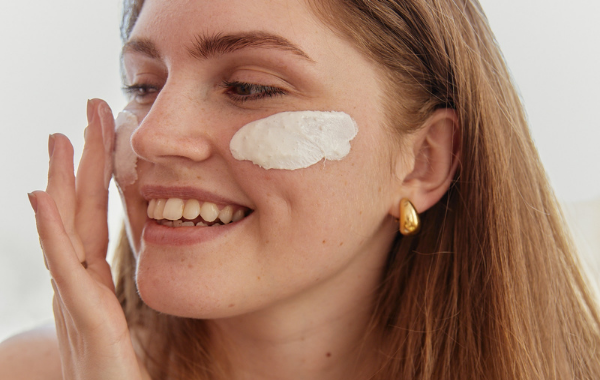The Miracle Guide To Beating Acne Breakouts

Wouldn’t it be nice to have left those acne breakouts in your teenage years? Unfortunately, many adult women find themselves still dealing with acne - as many as 15% of the population. So if you’re experiencing acne, you are not alone.
Dealing with acne breakouts can be stressful, which can even cause skin issues to worsen. Let’s dig into adult acne and its causes.

What causes sudden acne breakouts?
Before we talk about remedying acne breakouts, let’s define acne and how it affects your skin. Acne is a skin condition caused by your hair follicles getting plugged with oil and dead skin cells. This manifests as whiteheads, blackheads, and pimples.
What you might not have known is that your skin isn’t sterile. It’s a microbiome–a home to billions of microorganisms like bacteria and fungi. This microbiome can be disrupted by various environmental factors, including changes to your skin pH levels and overexposure to ultraviolet (UV) radiation. When these disruptions happen, you might experience skin dryness, signs of aging, and of course, acne breakouts.
This skin microbiome is also connected to another microbiome within your body, your gut. Just like your skin, your gut microbiome is home to trillions of different kinds of microorganisms. These microbes help your body control digestion, strengthen your immune system, and even modulate your brain health. Because they are connected, any disruption to your gut microbiome directly affects your skin. Intestinal problems, such as indigestion, are often linked to acne breakouts and skin inflammation.
Your skin is also directly tied to your lungs. This is because your lungs also have the task of regulating your body’s pH balance, in addition to your breathing. Thus any imbalances within your lungs, such as exposure to tobacco smoke, can affect your skin health.

Why do some people get acne breakouts more often?
Acne breakouts are more common in teenagers and young adults. However, that does not mean that adults are don’t break out easily either. There are a lot of variables that can affect how often someone experiences acne breakouts.
Genetics
Genetics influence everything in your body, from your hair and eye color to your hormone production. Due to this, you might produce more androgen, the hormone commonly associated with adolescent acne, than others. If one or both of your parents are prone to acne, then your acne breakouts may be hereditary.
Lifestyle
As previously mentioned, stress can be one of the causes of acne breakouts. Everybody associates stress with different things, like a person or a job. If you believe that stress is what’s causing you to experience acne breakouts, it’s essential to identify your stressor.
Sleep
Are you sure that you’re getting enough sleep? Not only will a healthy sleep schedule reduce your stress levels, but it can also help your skin glow.
Need some help getting sleep? Check out our article for some ideas on how to make your nights all the more restful.
Smoking
As mentioned previously, smoking can also negatively affect your skin. Smokers are more susceptible to acne breakouts. If you are a smoker, you should consider dropping the habit if you want healthier skin.
Too much sun
While exposure to sunlight helps your skin by giving you more Vitamin D, too much sunlight can be harmful to your skin. This is because the sun’s ultraviolet rays can damage your skin if you’re exposed to them for too long. 10-30 minutes of sunlight every day is all you need for your body to get the most benefits without getting damaged.
If your lifestyle requires you to get more than this amount of sunlight every day, you should invest in sunscreen with a Sun Protection Factor (SPF) of at least 30. This will ensure that you won’t be overexposed to the sun’s UV rays.
Sweat
Being in the sun’s heat for too long can also cause you to sweat. Whether from prolonged heat exposure or an intense power yoga session, sweat can cause your pores to clog up. If you want to lower your chances of having an acne breakout, you may want to reduce your sunlight exposure or workout intensity.
Diet
Additionally, your diet can also heavily influence the frequency of your adult acne breakouts. Many food items can cause you to experience them. The main culprits are greasy, oily fast foods that can cause you to have an excess of oil in your body.
As mentioned, your gut microbiome’s health is connected to your skin; thus, you should take care of your internal body. Having a balanced diet and consuming foods rich in antioxidants like oranges, strawberries, and nuts can help you maintain healthy skin.
Sugar
Another is sugar, which gets absorbed into your bloodstream and raises your sugar levels. Candy, soda, and chocolate are examples of sweets you may want to avoid to lower your sugar intake.
Dairy
A special mention goes to dairy products, such as milk and cheese. If you are lactose-intolerant, then you should avoid these foods. Not only will these cause indigestion, but they can also lead to acne breakouts as the two are linked.
If you need food suggestions to help prevent or treat acne, check out our previous article on adult acne diet tips.
Hygiene
If you don’t make it a point to take care of your skin, you’ll be more susceptible to acne breakouts. You also have to make sure that you’re using the appropriate products for your skin. Some products are meant specifically for people with oily, more acne-prone skin. Using inappropriate products may be a cause for acne breakouts.
Over-exfoliation
You must also be sure not to exfoliate your skin too often. You should only exfoliate your skin once or two times per week. Doing this too often can cause a variety of skin issues, such as irritation, redness, and skin inflammation, as well as disrupt your skin microbiome. These disruptions can make you more susceptible to adult acne breakouts.

What can I do to prevent my adult acne?
As with any health issue, you should find its root cause and address it before it becomes a significant problem. However, since there are so many variables, it can be challenging to identify the exact causes.
If you want clear, glowing, and acne-free skin, then you need to pay attention to your diet, stress levels, and other factors that cause acne. Using the proper hygiene products, having a balanced diet, and reducing stress levels can help prevent future breakouts.
Try to keep a food journal to help you monitor what you’re eating. Not only will this help you count calories and macronutrients, but doing this will also help you track foods that may be triggering your acne. This will make finding patterns between your acne breakouts and your food easier.

What can I do to treat my adult acne?
Once acne breakouts occur, there are ways to deal with them. Using skin exfoliating products, but not too often, can help remove the damaged skin cells and treat acne. But be careful not to use exfoliating products too often because this can also damage the skin.
However, you must be wary of using Accutane, otherwise known as isotretinoin. While it can help treat acne in some cases, it also has serious side effects in women.
As an alternative, you can opt for our all-natural acne remedy, Acne Be Gone. This remedy uses cleansing herbs traditionally used in TCM to help treat imbalances within the body.
Check out this article if you want to learn more.
If you want to try another natural remedy, you should check out our guide to making your own DIY acne mask.
If possible, it’s always a good choice to consult with a dermatologist if you think you need help identifying your triggers. As experts on the skin, they can help you identify what behavior patterns contribute to your skin acne. Additionally, they can also prescribe treatment and medicine.
The best way to treat adult acne is to prevent it. Do as much research on the topic as possible–which you’ve already done as you’ve been reading this article.








